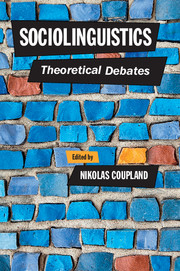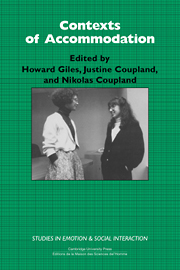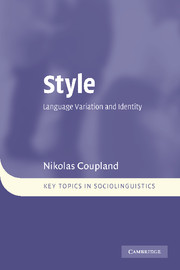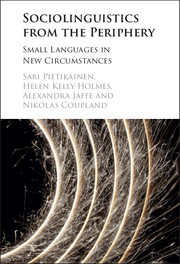Sociolinguistics
Sociolinguistics is a dynamic field of research that explains the role and function of language in social life. This book offers the most substantial account available of the core contemporary ideas and arguments in sociolinguistics, with an emphasis on innovation and change. Bringing together original writing by more than twenty of the field's most influential international thinkers and researchers, this is an indispensable guide to the newest and most searching ideas about language in society. For researchers and advanced students it gives access to the field's most pressing issues and debates, as well as providing a platform for new initiatives in sociolinguistic research.
- A landmark publication representing the newest and most distinctive ideas and arguments in sociolinguistics
- Brings together some of the field's leading thinkers and researchers, bringing key ideas and perspectives into dialogue with one another
- Explores relationships within sociolinguistics, but also between sociolinguistics and its neighbouring disciplines, enabling readers to reassess the boundaries around sociolinguistics: what it is, what it does, how it has changed, and how it continues to change
Reviews & endorsements
'This collection is clearly aimed at readers who already have a solid foundation in modern sociolinguistics and as such will likely stimulate new research directions. It should also prove useful to students of semiotics or linguistic historiography.' E. J. Vajda, Choice
Product details
July 2016Adobe eBook Reader
9781316685105
0 pages
0kg
5 b/w illus.
This ISBN is for an eBook version which is distributed on our behalf by a third party.
Table of Contents
- 1. Introduction: sociolinguistic theory and the practice of sociolinguistics Nikolas Coupland
- Part I. Theorising Social Meaning:
- 2. The 'push' of Lautgesetze, the 'pull' of enregisterment Michael Silverstein
- 3. Variation, meaning, and social change Penelope Eckert
- 4. Indexicality and ethnography Alexandra Jaffe
- 5. Sociolinguistic differentiation Susan Gal
- Part II. Language, Markets and Materiality:
- 6. Treating language as an economic resource: discourse, data and debate Monica Heller and Alexandre Duchêne
- 7. Theorizing the market in sociolinguistics Helen Kelly-Holmes
- 8. Embodied sociolinguistics Mary Bucholtz and Kira Hall
- Part III. Sociolinguistics, Place and Mobility:
- 9. Mobile times, mobile terms: the trans-super-poly-metro movement Alastair Pennycook
- 10. Sedentarism and nomadism in the sociolinguistics of dialect David Britain
- 11. From mobility to complexity in sociolinguistic theory and method Jan Blommaert
- Part IV. Power, Mediation and Critical Sociolinguistics:
- 12. Critical debates: discourse, boundaries and social change Sari Pietikainen
- 13. Theorizing media, mediation and mediatization Jannis Androutsopoulos
- 14. Foucault, Gumperz and governmentality: interaction, power and subjectivity in the twenty-first century Ben Rampton
- Part V. Sociolinguistics, Contexts and Impact:
- 15. Are there zombies in language policy? Theoretical interventions and the continued vitality of (apparently) defunct concepts Lionel Wee
- 16. Quantitative sociolinguistics and sign languages: implications for sociolinguistic theory Ceil Lucas and Robert Bayley
- 17. Theorising language in sociolinguistics and the law: (how) can sociolinguistics have an impact on inequality in the criminal justice process? Diana Eades
- Part VI. The Evolution of Sociolinguistic Theory:
- 18. Succeeding waves: seeking sociolinguistic theory for the twenty-first century Allan Bell
- 19. Language theory in twenty-first-century sociolinguistics: beyond Dell Hymes? Barbara Johnstone
- 20. Five Ms for sociolinguistic change Nikolas Coupland.








